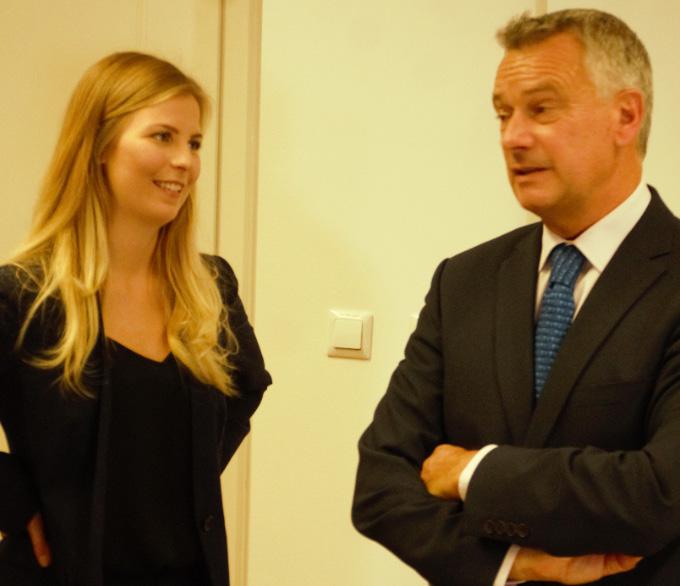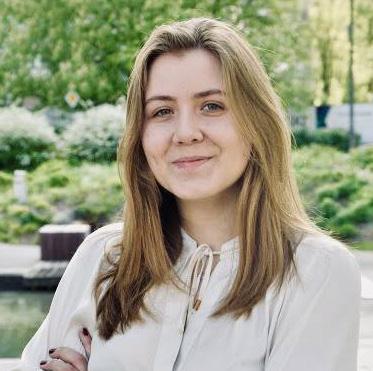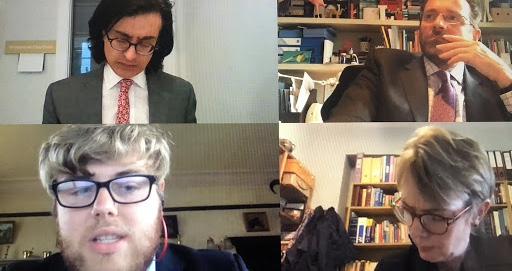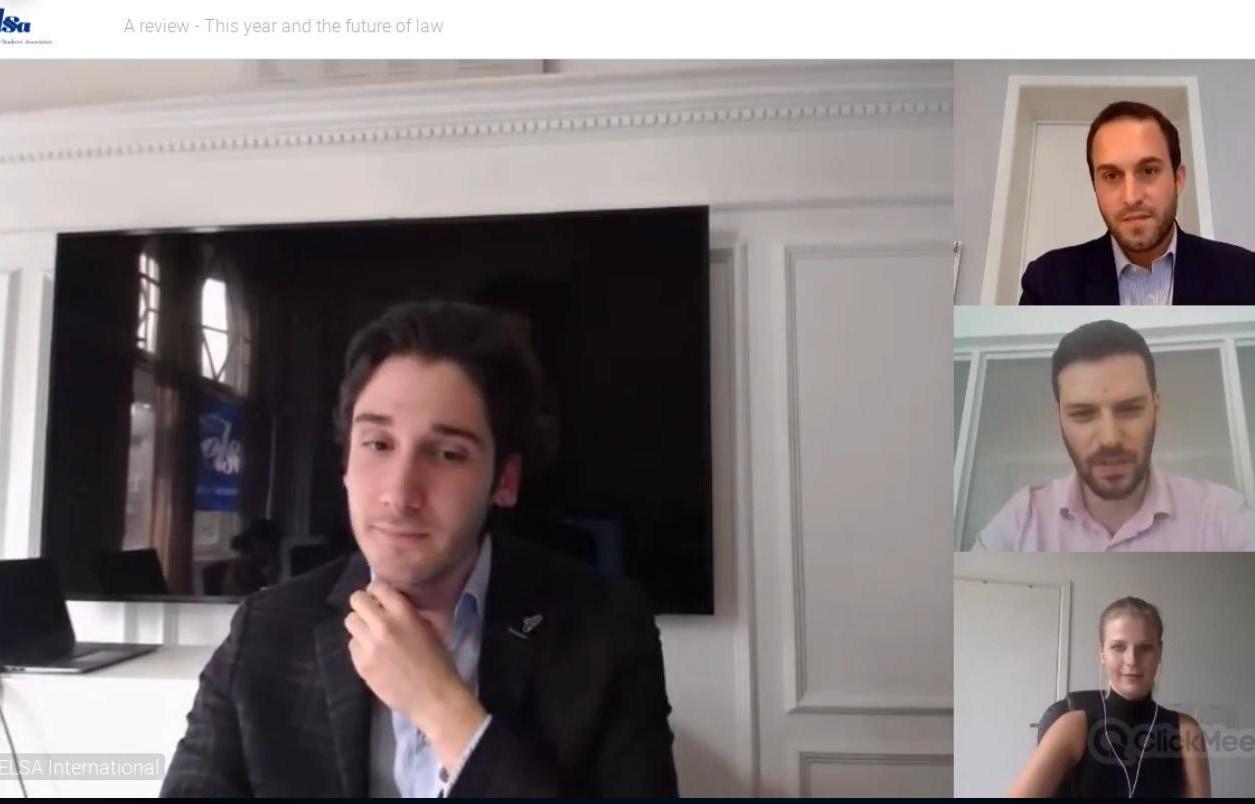
13 minute read
The 44th Member of ELSA
On June 13th in 2020, during the COVID-19 epidemic, ELSA Iceland’s membership application was accepted online with a unanimous vote by the Council at the 77th ICM. We, at ELSA Iceland, are incredibly proud and honored to have finally become a full member of ELSA. Becoming a full member has been our goal from the very start and being voted in with a unanimous vote has validated all our hard work and dedication and we are very grateful for the trust that the ELSA Network has shown in us.
We, at ELSA Iceland, are firm believers in ELSA’s motto “a just world in which there is respect for human dignity and cultural diversity”. We believe that cultural exchange is extremely important for young students. We want people to come together and learn from each other to make a just and a better world for everyone. That is why we’re so excited to have become a full member of the ELSA Network, so that we can finally make it possible for European students to come visit, study and work in Iceland. At the same time, we wish to encourage Icelandic students to come to European countries and learn from the other member countries of ELSA. We must combat isolationism and celebrate cultural diversity in this world, so there can be respect for human dignity. I am optimistic that ELSA Iceland will have a big impact on the ELSA network in the coming years and we greatly appreciate ELSA’s support and spirit.

Kristinn Snær Guðmundsson
ELSA Iceland
STEP offered for the first time in its 35 years of history also digital traineeship opportunities alongside the “traditional” on-site vacancies and professional development opportunities. Alongside introducing quality standards specific to the digital traineeships, ELSA introduced in the autumn 2019 the STEP Research Project (SRP), a novel initiative to address the legal loopholes in the current regulation of the STEP quality standards and furthermore create a wide overview of the status of the labour regulation affecting career starters across Europe. To find out more, please visit step.elsa.org.

A great goal of the association ever since the beginning of the year has been the digitalisation of our way of working and connecting with our membership and partners, not only in terms of event management, but also in terms of knowledge transfer and training. Powered by ELSA’s Webinar Partner, ClickMeeting, ELSA used webinars frequently: a. Internally, for knowledge management. Great examples constitute the webinars to prepare the researchers in ELSA publications, the webinars held to boost the fundraising and event management knowledge of the network in the times of Covid-19, as well as online events to present and explain the process of transforming a National Council Meeting or a National Moot Court Competition to successful digital events. b. Externally, for membership and partner engagement. One crucial aim for the ELSA Network during the previous year, as well as for the years to come, is the engagement of membership and partners through online events and specifically webinars. The Covid-19 pandemic, as well as the advanced number of ClickMeeting platforms and training sessions on how to utilise them, has transformed the perception of event organising in the ELSA Network. Members are engaging in larger numbers, as events become more and more inclusive. At the same time, ELSA’s partners have had the chance to interact with the members of the association and showcase their ability to adapt to these unprecedented times, as well as look for talent in the ELSA membership.

AN UNFACED CHALLENGE: THE FIRST ONLINE NCMs
For a student association like ELSA which is mainly based on the interaction of its members, the National Council Meeting (NCM) is not only our supreme decision-making body, but also the networking ground of the association. It is an opportunity for everyone to spend a weekend with the Network and live the ELSA spirit. Thus, it was quite a shock when the unexpected entrance of the COVID-19 crisis soon had us facing a new challenge: an online NCM!

There were two main issues to be cleared for the digitalization of the NCM. Firstly, we required governmental regulations to allow us to hold an online meeting, as it hadn’t been regulated in our statutes. Secondly, we had to find a trustworthy e-voting platform for the elections. During this process the interaction with other officers was a great help, as everyone shared their experiences, which allowed us to learn from each other’s struggles. As soon as the legal situation had been cleared, we finished our preparations and our very first online NCM took place via ClickMeeting and the elections were held via NemoVote. It was an unexampled experience for everyone: Sitting in front of a screen, instead of a plenary hall and enjoying the meeting all together. It is an indisputable fact that this crisis has pushed us all to our limits. Nevertheless, it was also a test that our association mastered excellently with a high level of competence in adaptability and cohesion. It even brought along innovation to our meetings such as the online voting which will surely make our elections more efficient and environmentally friendly in future. And this proves us again that this association has and will always hold together and find new ways to contribute to a just world in which there is respect for human dignity and cultural diversity!
Ilayda Suludere ELSA Austria
In response to the needs of today’s legal education, dictated inter alia by the COVID-19 situation, the brand of ELSA Webinars was launched. ELSA Webinars are events, which are broadcasted by means of an electronic communications network, follow certain marketing guidelines and are featured on webinars.elsa.org website. As the project massively evolved from March 2020 to August 2020 with over 60 various ELSA Webinars organised in 44 Member countries of ELSA, also the webinars website became widely recognised. In fact, it has become the second most visited ELSA associated website, with over 4000 views. 2020 can definitely be called the ELSA Webinars year in ELSA. Opening the doors to the future in the circumstances of presence, ELSA Webinars have certainly been the fastest growing Flagship Project of ELSA.

5- ELSA Delegations
ELSA Delegations, being one of the Flagships Projects of ELSA, which enables law students and young lawyers to experience international decision making in institutions, such as the United Nations, was another initiative that had to be cancelled due to the unforeseen circumstances brought by COVID-19. As this project plays a significant role in educating and advancing the skills of the members of ELSA, it was natural an alternative, online solution, to physical visits in international organisations would be created. As a result, “ELSA Delegations online” was created, as an opportunity to participate in events organised by WIPO, ITU, UNESCO and many more, from the comfort of one’s home. This way, ELSA members could still learn about the functioning of certain global entities, listen to the speeches of experts in the field from all over the world, and network with them in a digital sphere. To find out more about ELSA Delegations (online), please visit delegations.elsa.org.

ELSA Training is a project that aims at developing the skills and knowledge of ELSA members. The concept of ELSA Training was introduced in 1991 and since then many training sessions have been organised enhancing the soft skills of the participants. ELSA Training has been one of the main priorities for the International Board of ELSA for the term 2019/2020. During this year, a new branding was introduced for this project as well as a new website. However, due to the COVID-19 outbreak some of the projects that were supposed to help strengthen ELSA Training were cancelled. Some challenges inspire you with new ideas and help you see existing projects from a different perspective. Thus, the cancellation of the events and realisation of the fact that trainers would not be able to travel for quite some time to deliver physical training sessions inspired the International Board to rethink ELSA Training and offer online training sessions while physical meetings are still non feasible. For that very reason, the online Refreshment Weekend was organised for experienced Trainers from the International Trainers’ Pool in cooperation with“Eduk8”, the Erasmus Student Network’s (ESN)’s training project. This event was a huge success and helped ELSA’strainers see the potential of having training sessions online. The ELSA Network has already hosted over 5 online training sessions which indicates potential of the project.
ELSA WEBINARS THE PROJECT OF THE FUTURE

The spread of the SARSCoV-2 virus in the middle of the ELSA year has surprised us all. It has reduced many of our activities and made a revolution in our daily functioning. It was also a big challenge for all law students, members in the European Law Students’ Association in Poland (ELSA Poland) who planned for their terms many academic projects. ELSA Poland is active in 24 universities in 15 Polish cities. Each year we organise dozens of events, such as conferences or seminars. Most of them are organised in cooperation with academic centers, which were closed during the lockdown. However, where the others have seen obstacles, we have seen new opportunities. We moved our activities very fast into the online sphere. Taking advantage of the cooperation between ELSA and ClickMeeting, we started to teach our members how to use the platform. The outcome was unexpected. In the term 2019/2020, mainly between March and June, we organised over 100 webinars. We can say that necessity is the mother of invention, because we haven’t organised ELSA Webinars on such scale in ELSA Poland before. Projects have been very diverse. Both local and national events were digitised; internal training sessions, conferences and many more. They focused on very different areas of law and various topics. Webinars showed us that spreading ELSA Monika Walczak
ELSA Poland
values is possible under any circumstances and thanks to the accessibility of the online sphere we can reach various corners of Poland.
Now, after my term, I can say that I am proud that we adapted to the new reality so fast. We presented our flexibility and readiness for the challenges of the modern world. I wholeheartedly congratulate all organisers for their determination to maintain the originally planned projects and creative ideas for the new ones. I hope that webinars will stay in ELSA Poland for long and I’m crossing my fingers for their future development.
7- Online Mooting Uniting Law Students Globally
Each year, ELSA organises two great moot courts. The European Human Rights Moot Court Competition unites law students from all over Europe in their passion for human rights, and the John H. Jackson Human Rights Moot Court Competition connects law students from across the globe in their dedication to international trade law.
With a global pandemic, travel restrictions and institutions closing down, however, the future of these competitions looked bleak in the beginning of 2020. The executive board, however, decided not to give up as students from the entire world have worked tirelessly to participate in the competitions. Therefore, we created a new online pleading system to replace physical pleadings. This meant that most of the Regional Rounds and the Final Oral Round of the John H. Jackson Moot Court Competition were conducted virtually via Microsoft Teams. Likewise, the Final Oral Round of the European Human Rights Moot Court Competition was held on BlueJeans as facilitated by the Council of Europe.

We are proud to have offered interactive learning opportunities on topics that have shown to be vital during the pandemic, and we see this as a great new way of providing education in ELSA.

Laura Cestaro ELSA United Kingdom

Organising the ELSA United Kingdom Commercial Law Moot Court Competition (COMMOOT) Final online was the true embodiment of the phrase “modern problems require modern solutions”.

Due to take place on March 28th, 2020, like all other social activities, the event was largely impacted by the pandemic. This led not only to the first-ever virtual edition of COMMOOT, but also to one of the first fully digitised moot court competitions.
Organising such an event, whilst having little to no experience holding large events online, presented challenges. We felt the time pressure of swiftly moving everything online and had to adapt to operating video calling softwares and creating a new set of rules to accommodate the digital experience. We also feared that virtual mooting would take too much away from the in-person experience. Yes, team members had a harder time collaborating and supporting each other during judicial interventions and rebuttals, but, they learnt how to plead virtually in an effective way: a skill that will prove increasingly valuable in the prospective legal industry as many court hearings have, partly, moved online.
It was very exciting for everybody to see the process work much more smoothly than anticipated, and this would have not been possible without a strong motivation to keep momentum as well as thorough attention to detail, and clear communication with partners, judges, teams and OC. Digitalisation also presented unexpected advantages. Namely, that no costs incurred, that we easily found available replacement timekeepers despite the very few days left until the Final, and, most surprisingly, that we secured an extremely prestigious judge from another nation who would have not been able to join us otherwise.
Thankfully, all parties involved did not experience any technical drawbacks during the Competition and participants and judges found that mooting online “turned out better than expected”.

8- The first online Annual Reception of ELSA
How can associations adjust to the new age and organise successfully their Annual Receptions? This has been one of the questions ELSA has had to answer this year. For the first time, the Annual Reception of ELSA was organised in two events and the themes were the education of the future, the legal profession in the digital age and the protection and upholding of the rule of law. Alongside Arnold & Porter Kaye Scholer LLP, LexisNexis, UIA Union Internationale des Avocats, AIJA - International Association of Young Lawyers, the European Commission, the Erasmus Student Network, the College of Europe, BARBRI, QMUL, School of Law, The

University of Law, the Heidelberg Centre for Latin America, CATÓLICA GLOBAL SCHOOL OF LAW, IE Law School and ELSA Alumni, the executive board members of the International Board of ELSA discussed:
The future of higher education in the times of Covid-19; Global Organisations and their contribution to the rule of law; The future of the legal profession in this digital era; The ways to apply for and make the best out of your LLM year; Networking, recruitment and the ways to build an international legal career in this new decade.













